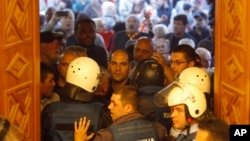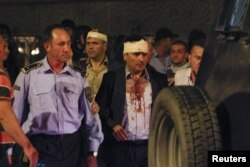The Macedonian Interior Ministry has suspended 16 police officers for their failure to prevent a violent storming of the parliament building by nationalist protesters.
The angry invasion of the parliament on April 27, which included masked men, resulted in dozens of journalists and lawmakers being injured, including Social Democratic Union leader Zoran Zaev.
Zaev is now attempting to form a government and become Macedonia's prime minister after he received the mandate from President Gjorge Ivanov, who had previously refused to do so.
The attack on parliament came after the appointment of an ethnic Albanian, Talat Xhaferi, as speaker.
The May 20 announcement named 11 police officers, four members of the special police unit, and a senior ministry official as being suspended because they "passively observed a crowd who entered and moved freely within the parliament...and did not help other police officers," the ministry said in a statement.
It added that disciplinary proceedings had also begun against the suspended police.
About 25 percent of Macedonia's 2 million citizens are ethnic Albanians.
The attack on parliament was seen as a blow for the country's aspirations to join both NATO and the EU.
Nationalists were upset by demands made by the ethnic Albanian parties that were negotiating to form a government with the Social Democrats, including making Albanian a second state language.
Some material for this report came from AFP and AP.












